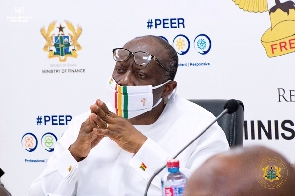Officials of the Trades Union Congress (TUC) have written to the Ministry of Finance to commence discussions on the minimum wage for the year 2021.
A statement issued by the TUC on the recently-held investiture of the President and the lawmakers for the 8th Parliament said for obvious reason the TUC has not been able to negotiate increases in the National Daily Minimum Wage and the Base Pay on the Single Spine Salary Structure for public sector workers for 2021.
“The TUC has already written to the Ministry of Employment and Labour Relations requesting for a meeting of the National Tripartite Committee meeting to commence negotiation of the national minimum wage for 2021 to pave way for the negotiation of base pay.
“We expect the negotiation of the national minimum wage and base pay for 2021 to be concluded before the National Budget is presented to Parliament in March 2021,” the statement said.
Regarding pensions, the statement said “In 2020, the TUC petitioned President Akufo-Addo to approve a top-up of pension benefits for workers who retired in 2020 under the new Pensions Act (Act 766) to ensure that they were not worse-off compared to benefits they would have received if they had retired under PNDC Law 247.
“Government graciously granted our request. We expect the top-up to be paid to the beneficiaries as soon as possible. We know that workers who will retire in 2021 and 2022 may also face the same challenge.
“We appeal to government to ensure that no worker is worse-off no matter which year they retire. The government must bear the full responsibility of any shortfall in pension benefits until the benefits under Act 766 and PNDCL 247 are equated.
“In his State of the Nation Address, the President announced government’s decision to exclude all security agencies from the unification pensions. We regret to inform the President that TUC cannot support such a policy.
“It should be noted that pension unification is an important component of the pension reform. The decision to allow security agencies to continue to enjoy benefits under the noncontributory CAP 30 scheme undermines the solidarity principle which served as a key guiding principle for the pension reform initiative.
“That decision also contravenes the principle of equality of treatment in employment, as clearly stipulated in the International Labour Organisation (ILO) Convention 111 (Discrimination–Employment and Occupation) which was ratified by Ghana in 1961. It entrenches a class system in pension administration where workers under the Social Security and National Insurance (SSNIT) scheme, who contribute toward their pensions, have inferior pension benefits compared to those who do not contribute towards their pension under the CAP 30 scheme. “
Business News of Tuesday, 12 January 2021
Source: 3news.com













